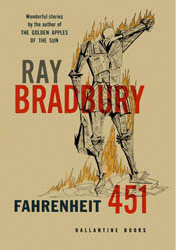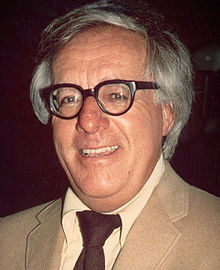Fire vs. Freedom…
Author: Ray Bradbury
Consistently appearing on lists of the top ten science fiction novels of all time, Fahrenheit 451 is Ray Bradbury at his eloquent and subversive best. While he rejected the label of science fiction writer – calling himself a writer of fantasy – it is undoubtedly the work for which the prolific author is best known. Assigned to high school reading lists for decades, it provides an answer to the trivia question, “At what temperature does book paper burn?”
At some ill-defined time, many decades in the future, Guy Montag is a fireman. But advanced technology has eliminated house fires as a public concern and the honorable occupation has been repurposed to assist the government in ridding society of a new menace. Books. All of them. Given that books frequently contain disturbing or upsetting ideas, the government has declared books illegal in order to make society a happier place. Pursuing anonymous tips, teams of fireman are tasked with raiding the homes of rebellious book owners and burning any books they find, along with the entire house as added punishment. With plenty of macho swagger, Guy and his fire-wielding comrades hunt down their quarry with great enthusiasm, confident in the moral rectitude of their quest.
But as we learn more, it’s clear that all is not perfect in Guy’s world. His loveless marriage is a shambles as his wife is addicted to reality TV and sleeping pills and some disturbing experiences cause him to start questioning the virtue of his occupation. He begins to wonder what’s in these books that make them so dangerous. As we follow Guy’s transformation, we learn more about the dark side of this future society and meet some of the defiant bibliophiles who guide him.
Despite the dark, dystopian tone of the work, Bradbury’s unique assets as a descriptive writer are at full strength here – one of the reasons he’s always been one of my favorite sci fi writers. Fire, smoke and soot are omnipresent and this depiction of a burning book is eerily mesmerizing:
“Watch. Delicately, like the petals of a flower. Light the first page, light the second page. Each becomes a black butterfly. Beautiful, eh? Light the third page from the second and so on, chain-smoking, chapter by chapter, all the silly things the words mean, all the false promises, all the second-hand notions and time-worn philosophies.”
It’s been sixty years since this book was first published and while it’s pretty hard for any science fiction work to still pack a punch at such an age, I think it does remarkably well. I first read the book when it was only half as old and this time I was surprised by how many of Bradbury’s predictions have materialized since then. It’s tempting to simply judge anything in the genre by the accuracy of the technological speculations, but there’s a lot more here about who controls information, ideas and the very nature of reality. Issues that are at the forefront of many debates about how we define freedom in modern society.
Ironically, the book has frequently been challenged by parents due to mildly offensive language and the mistaken impression that it advocated book burning, the Bible in particular. Once again, it seems that the strongest advocates for removal of books from the classroom or library seem to be those who never quite got around to reading the whole book. Even the book’s publisher – Ballantine Books –got in on the act, expurgating “offensive” words from dozens of passages in editions published between 1967 and 1980 when Bradbury found out about the changes and quickly quashed the censorship. I suspect that the version I read was one of the “cleansed” ones. Irony with a capital I.
In the final analysis, the true measure of quality science fiction is whether it has something important to say about society. In my opinion, Fahrenheit 451 fares very well by this standard. A passionate and prescient novel that may actually be growing more meaningful with age.
— D. Driftless
author photo by Alan Light
- Best Non-Fiction of 2016 - February 1, 2017
- Little Free Library Series — Savannah - May 22, 2015
- Little Free Library Series — Wyoming - November 30, 2014




Leave A Comment